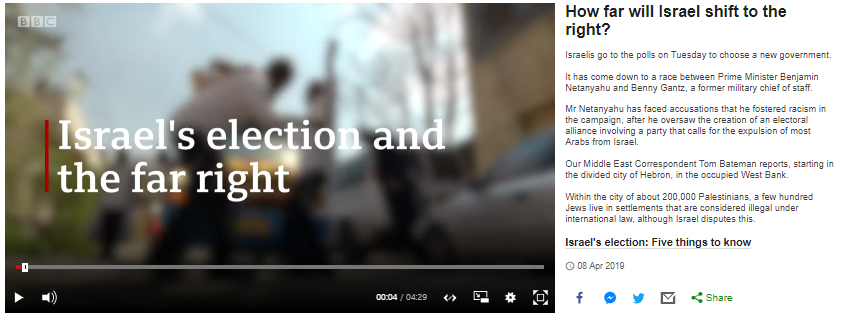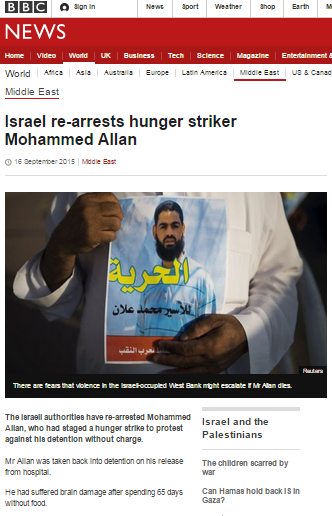The BBC’s Paul Moss has been visiting Lebanon and on May 14th the BBC World Service radio programme ‘Newshour‘ aired his report (from 45:06 here) about the possibility of a war between Israel and Hizballah.
Apparently inspired by statements made by Hizballah leader Hassan Nasrallah, Moss’ report – including the introduction from Julian Marshall – is notable for the fact that it fails to inform listeners even once of the decidedly relevant fact that Hizballah is a terrorist organisation proscribed by many Western and Arab states alike.
[emphasis in italics in the original, emphasis in bold added]
Marshall: “With today’s bloodshed in Gaza it might be hard to imagine but there is the possibility of an even more serious conflict brewing on Israel’s northern border with Lebanon. Last week Israel exchanged fire with Iranian forces in Syria and with their allies, the Lebanese group Hizballah. And today Hizballah’s leader suggested they could launch more attacks on Israel. What many people in Lebanon now fear is that the conflict could spread to their country. It happened before in 2016 [sic], leaving more than twelve hundred Lebanese dead. So could it happen again? From Beirut, Paul Moss reports.”
The BBC’s portrayal of the topic of Lebanese casualties during the Second Lebanon was has long been hallmarked by a glaring and consistent absence of any mention of Hizballah combatants. Although the Lebanese authorities did not differentiate between civilians and combatants during the 2006 war, Lebanese officials nevertheless reported even before the conflict was over that some 500 of the dead were Hizballah personnel. UN officials gave similar figures while Israeli estimates stand at around 600 (with 450 identified by name: see page 55 here).
Moss began his report in a shop in Lebanon where the shopkeeper allegedly struck up a conversation about a “deadly war” between Israel and Lebanon. Moss went on to give another euphemistic portrayal of Hizballah itself and also of its relationship with its patron Iran. Remarkably, he failed to make any mention of the fact that Iran supplies its proxy with both funds and weapons.
Moss: “It’s the kind of defiance which even the most mild-mannered Lebanese citizens tend to boast of. Yet there is a genuine worry here right now. The powerful Lebanese political and military group Hizballah has been fighting alongside its allies Iran and both groups have now come under fire from Israel. Israel in turn has been on the receiving end of rockets fired at the Golan Heights and today the Hizballah leader Hassan Nasrallah warned this would not be the only response Israel would get. All of these are threats which Israel seems unlikely to ignore.”
Listeners next heard from Lebanese journalist Patricia Khoder.
Khoder: “Israel would not accept Hizballah growing and Iran growing on its borders and this is what is happening for the time being. So at some point maybe there would be an Israeli attack, Israeli offensive in Lebanon.”
Moss then gave listeners an inaccurate portrayal of how the Second Lebanon war began. It was of course Hizballah that initiated the conflict by carrying out a cross-border raid into Israeli territory and concurrently fired missiles at Israeli civilian communities before any Israeli response took place.
Moss: “Patricia Khoder is a writer for L’Orient le Jour newspaper here. She was reporting when Israel last attacked Hizballah in Lebanon back in 2006 and fears Lebanon once again being the arena where this battle is played out – although this time, she says, Hizballah is better armed.”
Khoder: “We don’t have figures but Hizballah is saying that it has 100,000 weapons. Now, they fought in Syria and they were trained as an army and Iran also is training them and Israel would not accept this.”
Curiously, Moss showed no interest in informing listeners that those weapons were supplied to Hizballah by Iran – in violation of the UN SC resolution that brought the previous war between Israel and Hizballah to an end. Listeners did however hear some interesting advance framing:
Moss: “If there was a conflict, what could Hizballah possibly achieve from it? It would be just a defensive war, wouldn’t it?”
Khoder: “Personally I don’t think Hizballah would achieve a lot. It would be a horrible war that would put Lebanon on its knees.”
Listeners heard some ‘man in the street’ interviews with Hizballah supporters before Moss spoke to a member of Lebanon’s Kataeb party (Phalange) called Michel Ragien [phonetic].
Ragien: “They [Hizballah] follow the Iranian orders and if they consider that Iran is being threatened definitely Hizballah will act to cause the war. They will trigger it if they consider that it should be triggered. So now it’s a matter of tactics.”
Moss: “So what are you going to do? Are you going to try and stop Hizballah?”
Ragien: “No, no, no. Unfortunately the decision is in the hand of the Hizballah. They will choose the moment and the way.”
The report ended with more ‘man in the street’ interviews.
In the programme’s synopsis Moss’ piece was described as “a special report from Lebanon”. It is of course difficult to see what is ‘special’ about an item that conceals the fact that Hizballah is a terrorist organisation, erases relevant repeated violations of more than one UN Security Council resolution and misinforms audiences with regard to how the previous war in Lebanon began. After all, BBC reports have been doing that for years.
Related Articles:
Reviewing BBC reporting of Hizballah’s violations of UNSC Resolution 1701




